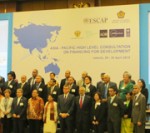
“No region is better placed than Asia and the Pacific to shape the means of implementation for the post-2015 development agenda,” Shamshad Akhtar, United Nations Under-Secretary-General and Executive Secretary of the United Nations Economic and Social Commission for Asia and the Pacific (ESCAP) told a high-level meeting on sustainable development financing in Jakarta on 29 April.
“For too long there has been a great deal of talk, but now we are discussing the specifics of the financing framework, with concrete actions. One of the key priorities is to recognize the importance of and scope for domestic resource mobilization, to tap the large pool of regional savings, and to upscale climate finance to leverage development.”
“Without a far-reaching financing strategy, the visionary goals and new agreements will not be deliverable in the Asia-Pacific region or globally”
Shamshad Akhtar, UN Under-Secretary-General and Executive Secretary of ESCAP
More than 200 participants from almost 40 countries met for an Asia-Pacific high-level consultation in Jakarta on 29-30 April, to build forward-looking consensus on financing for sustainable development. The meeting was co-hosted by ESCAP and the Ministry of Finance of the Republic of Indonesia, in partnership with the Asian Development Bank, the Asian Development Bank Institute and the United Nations Development Programme.
The UN has declared that 2015 will be a year of global action, with the international community expected to adopt a transformative post-2015 sustainable development agenda and a meaningful agreement on global climate change action.
“Without a far-reaching financing strategy, the visionary goals and new agreements will not be deliverable in the Asia-Pacific region or globally,” said Ms. Akhtar. “The outcome of this key consultation will be our region’s input to the Third International Conference on Financing for Development, from 13 to 16 July 2015, in Addis Ababa, Ethiopia.”
ESCAP’s recent estimates of the annual availability of financial resources for sustainable development in Asia and the Pacific, show that levels of official development assistance, while important, are relatively low at $30 billion. Other potential sources include $218 billion in remittances, $492 billion in foreign direct investment, $4 trillion in fiscal revenues, and $6 trillion in private savings. In addition, the stock of financial assets of the region’s most wealthy individuals amounted to $35 trillion in 2013.
“Working together, we should seek three key outcomes in Addis: a cohesive and holistic financing framework for sustainable development; concrete deliverables; and a strong follow-up process”
Lenni Montiel, UN DESA’s Assistant Secretary-General for Economic Development
Bambang PS. Brodjonegoro, Minister of Finance of Indonesia said that: “This consultation can act as a valuable means […] to build an enhanced development partnership within the Asia-Pacific region. In addition, this high-level consultation will result in tangible and actionable recommendations to improve regional financial capacity to support the emerging sustainable development goals, as well as the development of additional and innovative financing sources and instruments to meet these objectives.”
Lenni Montiel, UN DESA’s Assistant Secretary-General for Economic Development also addressed the event, describing the intensified groundwork for this major event. “Preparations for Addis are gaining momentum,” he explained. “Member States, civil society and the business sector are fully engaged,” he said, adding that all five major institutional stakeholders have been actively involved in the process, namely the World Bank, IMF, WTO, UNCTAD and UNDP.
“Over the next months we must work together to mobilize strong political commitments,” Mr. Montiel stressed. “We must reach out to ensure the highest level of participation at the Conference,” he added, also calling for the highest possible participation from countries in Asia and the Pacific.
“Working together, we should seek three key outcomes in Addis,” Mr. Montiel said. “A cohesive and holistic financing framework for sustainable development; concrete deliverables; and a strong follow-up process.”
